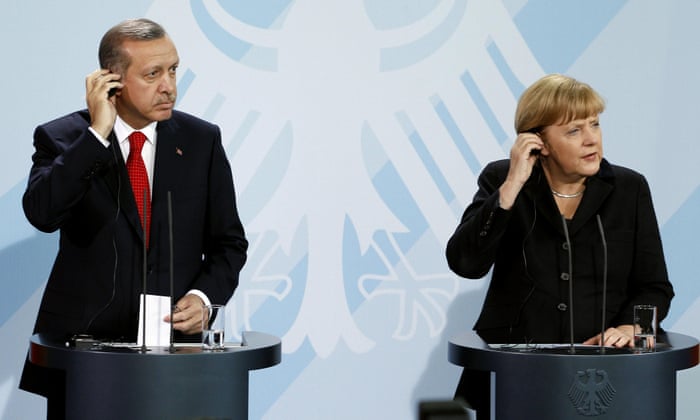A Brief Colonial History Of Ceylon(SriLanka)
Sri Lanka: One Island Two Nations
A Brief Colonial History Of Ceylon(SriLanka)
Sri Lanka: One Island Two Nations
(Full Story)
Search This Blog
Back to 500BC.
==========================
Thiranjala Weerasinghe sj.- One Island Two Nations
?????????????????????????????????????????????????Thursday, March 2, 2017
Angela Merkel urged to ban Erdoğan over jailed German journalist
Chancellor under pressure to stop Turkish president from entering country while reporter is held in Istanbul prison

Recep
Tayyip Erdoğan and Angela Merkel in 2012. The Turkish president has
increasingly cracked down on press freedom. Photograph: Michael Sohn/AP

Angela Merkel is facing calls to ban the Turkish president, Recep Tayyip Erdoğan, from entering Germany while a German journalist continues to be held in an Istanbul prison.
Erdoğan, who campaigned in Germany in
2011 and 2014, was rumoured to be planning a political rally to secure
the symbolically important diaspora vote before April’s referendum in
Turkey on giving him greater powers.
But Merkel’s government is under increasing pressure from German
coalition and opposition parties to stand up to the Turkish president
after the Turkey correspondent of Die Welt newspaper, Deniz Yücel, last
month became the first German citizen to be arrested as part of Erdogan’s crackdown on the press.
Ralf Jäger, the interior minister of North-Rhine Westphalia and a member
of the Social Democratic party that forms a coalition with Merkel’s
CDU, called on the government to “ensure that such rallies take place
neither in North-Rhine Westphalia or elsewhere in Germany”. Stephan
Mayer, of the Bavarian party CSU, said a Turkish president who
imprisoned German journalists was “not welcome as a guest in Germany”.
Sevim Dağdelen, a Left party MP with Kurdish origins, said Merkel had “a
political duty and the legal means to stop the Turkish head of state
from campaigning on German soil for the abolition of democracy and the
introduction of the death penalty”.
Austria has already told Erdogan he is not welcome to campaign for votes
amongst the Turkish diaspora in the country, with foreign minister
Sebastian Kurz saying in a statement that “we clearly reject bringing
the Turkish campaign and polarisation to Austria”.
But on Wednesday Merkel’s spokesman said a ban would send the wrong signal.
Steffen Seibert said: “The German government deplores the fact that
freedom of speech and freedom of the press are currently limited in Turkey to an unacceptable degree.
“If we deplore this in another country, then we should be even more
alert to make sure that freedom of speech is respected, within the
framework of the law, in our own country. We should demonstrate what we
demand from others.”
Niels Annen, the Social Democrats’ foreign policy spokesman, praised the
government’s decision to rule out a ban but said the current diplomatic
crisis was a result of the German chancellor letting the refugee swap deal between
Turkey and the EU influence her dealings with Erdoğan. “Merkel is no
longer a believable advocate for democracy and the rule of law in
Turkey,” he said.
In the referendum on 18 April, the Turkish public will vote on proposed changes that would boost the powers of the president,
allowing Erdoğan to scrap the post of prime minister, control budgets,
appoint more judges and stay in office for two more terms.
The support of the Turkish diaspora in Germany, a community of about 1.4
million people, holds an important symbolic significance to Erdoğan’s
party. “Pictures of German stadiums filled with pro-Erdoğan supporters
allow the AKP to project itself back to Turkey as the one party that
protects Turks around the world,” said Alexander Clarkson, a researcher
on the interaction between German politics and migrant communities at
Kings College London.
In reality, he said, the impression of overwhelming support for Erdoğan
among Turks living in Germany is a “statistical card trick”. Clarkson
added: “Of those with Turkish roots entitled to vote at the last
election, only 40% turned out to the polling booth, of which 60% voted
for Erdoğan. Many diaspora Turks in Germany are indifferent to Turkish
politics, if not actively hostile to the current president.”
TGD, an association that represents a large part of the Turkish community in Germany, has announced that
it will campaign for a no vote in the referendum, stating in a
resolution that it “rejects all attempts to turn the country into a
one-man regime”.
